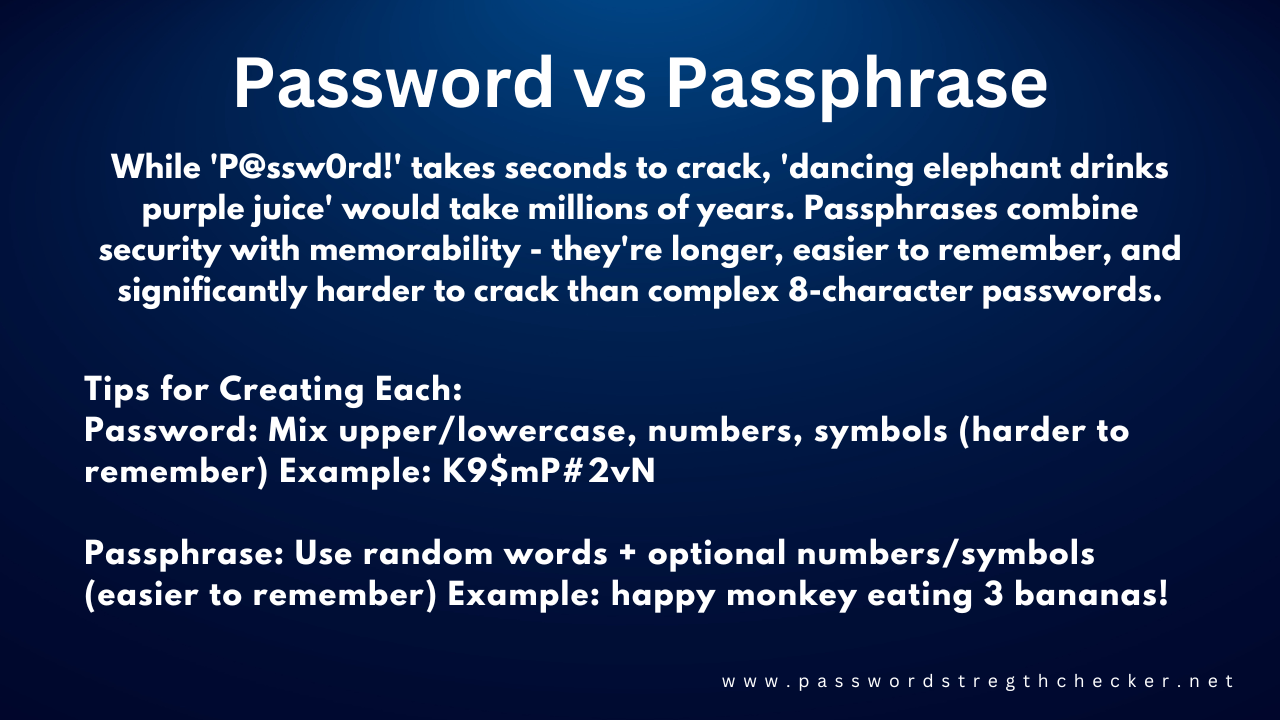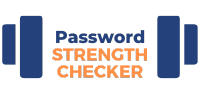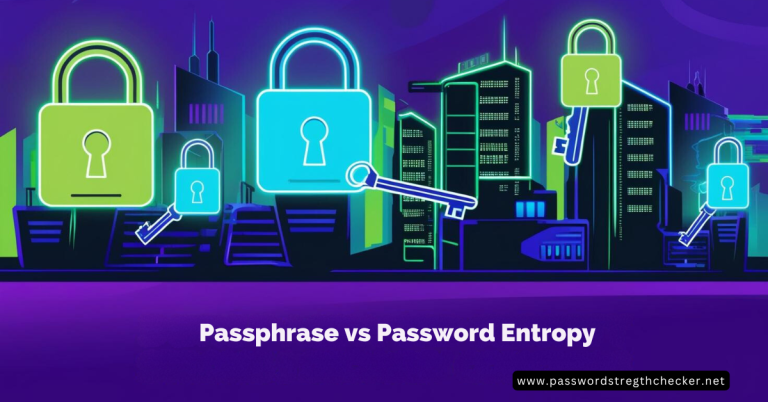Book Appointment Now

What Makes a Password Strong? Tips for Enhanced Security
You know what’s crazy? It takes just 2 seconds to crack the password “password123”, but over 400 years to crack “purpleMonkey55!dish@2”! I learned this the hard way back when I was working in IT support. One of our clients had their entire system compromised because they thought adding “123” to the end of “password” made it secure enough. Spoiler alert: it didn’t!
I’ve spent years helping people create stronger passwords, and I’m going to share everything I’ve learned about what really makes a password strong. Trust me, it’s simpler than you might think – and you won’t need a photographic memory to remember them!
The Four Pillars of Password Strength
Let me tell you about what I call the “Four Pillars of Password Strength.” I came up with this framework after seeing countless passwords get cracked during security audits. It’s like building a house – you need all four pillars to keep it standing!
- Length: Think of this as the foundation. Just like you wouldn’t build a house on a tiny plot, you don’t want a tiny password!
- Complexity: This is like having different types of materials in your house – the more variety, the stronger it is.
- Uniqueness: Would you use the same key for your house, car, and office? Nope! The same goes for passwords.
- Randomness: If everyone built their house the same way, burglars would have an easier time. Your password needs to be unpredictable.
I once had a client who used “Password1!” for everything because it had all the “required” elements. Guess what? Their account got hacked within a week. Which brings me to our next point…
Password Length: The Most Important Factor
Here’s something that blew my mind when I first learned it: length beats complexity every time! I used to think adding a bunch of special characters to a short password made it super secure. Boy, was I wrong!
Let’s break it down:
- An 8-character password: Takes about 1 hour to crack with modern computers
- A 12-character password: Takes about 2 weeks
- A 16-character password: Takes several YEARS
- A 20-characters long password: Takes longer than the universe has existed!
I switched all my passwords to at least 16 characters after learning this. Sure, it took some getting used to, but it’s way better than dealing with a compromised account!
Complexity: Mixing Character Types Effectively
Okay, so here’s where I made a huge mistake early in my career. I thought making passwords like “P@ssw0rd” was clever. Spoiler alert: hackers have seen every common letter-to-symbol substitution in the book!
Instead, try this approach I developed:
- Start with a base phrase you’ll remember
- Add unexpected numbers (not your birth year!)
- Throw in special characters where they make the least sense
- Mix up the case in non-obvious ways
For example: “jumpingFrogs722%onLily!pad”
See what I did there? The numbers and symbols aren’t in the usual places, making it much harder to crack.
The Math Behind Password Strength
Get ready for some mind-bending math! (Don’t worry, I’ll make it simple – I’m not exactly a math whiz myself!)
Password entropy is like measuring how unpredictable your password is. Here’s a simple way to think about it:
– Each lowercase letter: 26 possibilities
– Add uppercase: Now 52 possibilities
– Include numbers: 62 possibilities
– Add special characters: 95 possibilities
Every character you add multiplies these possibilities. It’s like playing the lottery – the more numbers you need to match, the harder it gets to win (or in this case, crack).
I remember testing this with a password-cracking tool during a security course. A simple 8-character password took minutes to crack, while our 16-character test password was still running when the course ended three days later!
Common Password Patterns to Avoid
Oh boy, do I have some stories about bad passwords! These are the patterns I see people using all the time (please don’t!):
– Keyboard walks (qwerty, 123456)
– Personal info (pets, birthdays, kids’ names)
– Simple word + number (monkey123)
– Popular substitutions (p@ssw0rd)
– The current year (anything2024)
I once had a user who thought they were clever using “qazwsx123” because it made a pattern on the keyboard. Guess what? That’s one of the first patterns password crackers try!

Creating Memorable Yet Strong Passwords
Here’s my favorite trick for creating strong and unique passwords you can actually remember: create a story! I call it the “Story Method.”
Example story: “My 3 cats knocked over 2 plants while chasing a butterfly!”
Password version: “M3cko2pwcaB!”
See what I did there? It’s meaningful to you but looks like complete gibberish to everyone else. I’ve been using variations of this method for years, and it hasn’t failed me yet!
Tools for Testing Password Strength
Now, don’t just take my word for all this! Here are some tools I use regularly:
- Password strength meters (but don’t trust them blindly!)
- Password generators for inspiration
- Entropy calculators
- Regular password audits
Warning: Never test your actual passwords on random websites! I learned this lesson the hard way when a colleague used an untrustworthy “password checker” that was actually harvesting passwords.
Password Management Best Practices
Let’s wrap this up with some solid practices I’ve developed over years of trial and error:
- Update critical passwords every 3-4 months
- Use different passwords for every important account
- Keep a secure backup of recovery codes
- Consider using a password manager (game-changer!)
The biggest mistake I see? Using the same password everywhere. I get it – I used to do it too! But after helping clean up after several account breaches, trust me, it’s not worth the risk.
Conclusion
Look, I know this might seem like a lot to take in. But here’s the thing – you don’t have to implement everything at once. Start with length (remember, at least 16 characters!), add some complexity, and build from there.
Take it from someone who’s seen the aftermath of weak passwords – spending a few minutes creating strong passwords now is WAY better than spending hours (or days) dealing with a hacked account.
Why not take a moment right now to check your most important password against what you’ve learned? Are you hitting all four pillars of password strength? If not, you know what to do!
Share your own password horror stories or tips in the comments below (but please, no actual passwords!). We’re all in this security journey together!
P.S. If you found this helpful, don’t forget to bookmark it for future reference. Password security is a journey, not a destination!



